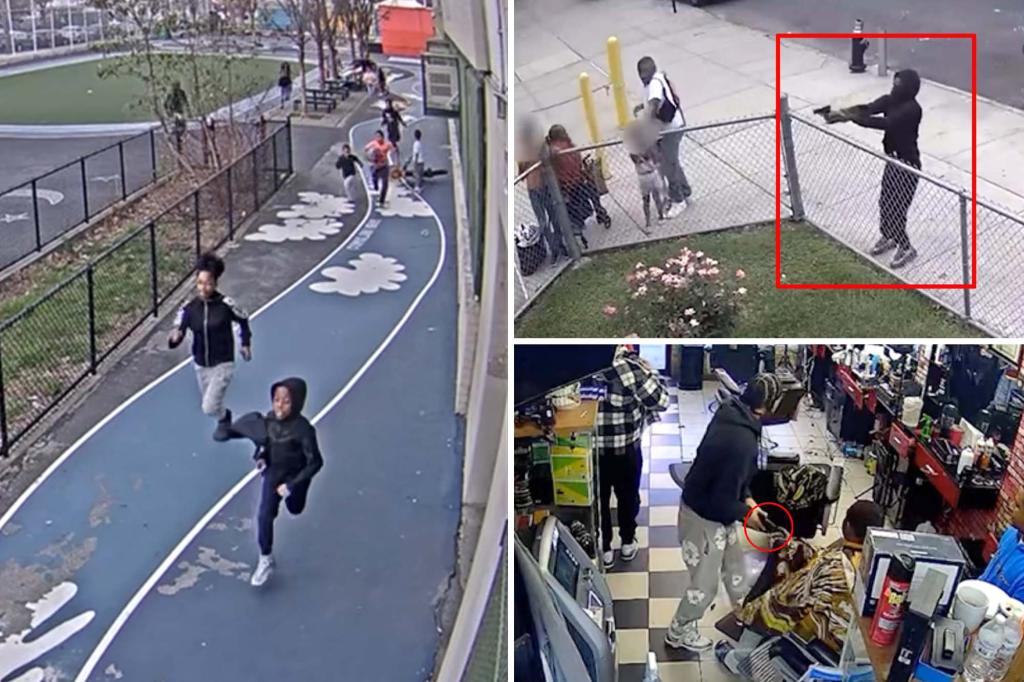Youthful Faces, Dangerous Games: NYC’s Streets Turned into a Battleground
A viral video capturing young individuals firing guns recklessly on New York City streets has ignited outrage and fear among residents. The footage, filmed last week in broad daylight, shows teens turning a Brooklyn neighborhood into a chaotic shooting gallery, forcing families and schoolchildren to scramble for safety. Authorities confirm the incident reflects a troubling surge in youth-involved gun violence, raising urgent questions about public safety and community intervention.
Alarming Footage Sparks Community Outcry
The 90-second clip, shared widely on social media, depicts at least five masked individuals—some appearing as young as 14—firing handguns near a busy intersection. Bullets ricochet off parked cars as pedestrians dive behind trash bins. One witness, Maria Gonzalez, described the scene as “like a war zone.”
“I heard pops and thought it was fireworks until I saw kids running,” said Gonzalez, a local daycare worker. “These are babies shooting at other babies. When did this become normal?”
NYPD data reveals a stark trend:
- Juvenile gun arrests rose 32% citywide in 2023 compared to pre-pandemic levels
- Over 40% of recovered crime guns linked to teen suspects had obliterated serial numbers
- Social media taunts preceded 60% of last year’s youth shooting incidents, per police analysts
Root Causes: Poverty, Social Media, and Systemic Failures
Experts point to a toxic cocktail of factors driving the crisis. Dr. Elijah Carter, a criminologist at Columbia University, notes: “These kids aren’t born violent. They’re products of fractured homes, underfunded schools, and neighborhoods where guns are easier to access than jobs.”
Meanwhile, platforms like TikTok and Snapchat amplify conflicts. A 2023 Journal of Urban Health study found that NYC teens in gang-adjacent circles spend 6+ hours daily on social media—three times the national average. “Digital bravado translates to real-world violence,” Carter added.
Community Responses: Crackdowns vs. Compassion
City leaders remain divided on solutions. Mayor Eric Adams advocates stricter policing, including:
- Expanded stop-and-frisk zones
- Mandatory ankle monitors for repeat offenders
- Social media monitoring by NYPD cyber units
However, grassroots organizers argue punitive measures backfire. “You can’t arrest your way out of this,” said Terrell Jones, founder of the anti-violence group Save Our Streets. “We need mentorship programs, trauma counseling, and—frankly—a living wage for these kids’ parents.”
Jones’ team has successfully mediated 140+ conflicts this year through street outreach. Yet with city youth program funding slashed 18% since 2020, such efforts operate on shoestring budgets.
A Generation at Risk: Psychological Toll and Future Projections
Child psychologists warn of long-term consequences. Dr. Amina Ndiaye of Bellevue Hospital reports a 300% increase in PTSD cases among children exposed to neighborhood shootings since 2019. “When gunfire replaces playground sounds, it rewires developing brains toward hypervigilance and aggression,” she explained.
Without intervention, models predict:
- Youth homicide rates may double by 2026 in high-risk boroughs
- 60% of current teen shooters will reoffend within five years
- Economic costs from related healthcare and incarceration could top $2 billion annually
Path Forward: Balancing Enforcement and Empathy
Some neighborhoods are pioneering hybrid approaches. In Queens’ South Jamaica, a pilot program pairs police with social workers to conduct home visits for at-risk youth. Early results show a 45% drop in juvenile weapons charges since its 2022 launch.
National experts suggest replicating such models, alongside:
- State-funded firearm buyback initiatives
- After-school tech training to divert teens from gangs
- Mental health screenings in middle schools
As summer—traditionally peak season for youth violence—approaches, the clock ticks for solutions. “This isn’t just about crime stats,” said Jones. “It’s about whether we’ll abandon a generation or fight for them.”
Call to Action: Residents can report illegal firearms anonymously via the NYPD Gun Stop Program (1-866-GUN-STOP) or volunteer with community coalitions like Save Our Streets.
See more CNN Headline


